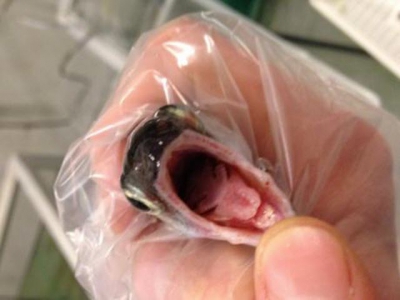Fish disease guide - Enteric Red Mouth Disease

What is it?
The causative agent of enteric red mouth disease is the bacterium Yersinia ruckeri.
There are several serotypes of the bacterium, and classification systems can be based upon whole-cell typing as well as individual cell-wall antigen groupings. The serotype responsible for enteric red mouth disease is the Hagerman strain, serotype O1a, which is considered to be the most virulent.
The disease is known to affect a wide variety of fish of all ages.
The disease causes septicaemia as bacteria spread through the body via the blood. Outbreaks usually begin with low mortalities that slowly escalate. The severity of the outbreak depends on the strain and presence of stressors.
Where and When Might it Occur?
The disease can be transmitted horizontally via contact with infected fish or carriers, which may not show any signs of the disease.
Carriers are particularly important sources of infection under stressful situations e.g. increasing temperature.
Vertical transmission from fish to egg is also suspected but it is not yet proven.
Diagnosis
Fish infected with the disease may separate themselves from other fish and show signs of nervousness.
Mortalities start low and rise in later stages.
Gross pathological signs are:
• Dark body colour (seen in atypical infections)
• Haemorrhages at base of paired fins and vent
• Reddening (subcutaneous haemorrhages) of the gill cover, corners of mouth, gums, palate and tongue
• Exophthalmos (popeye) and orbital haemorrhages
• Loss of appetite
• Swollen abdomen
• Ascites (fluid in the abdominal cavity)
• Pinpoint haemorrhages on the liver, pancreas, pyloric caecae, swim bladder and lateral musculature surfaces
• Enlarged, friable black spleen
• Inflamed lower intestine containing thick yellow fluid.
Microscopic pathological signs are:
• Generalised haemorrhagic septicaemic inflammatory response of all tissues
• Cc
• Necrosis of haematopoietic tissue in the kidney and spleen.
Related news
 Fish disease guide - Infectious Haematopoietic Necrosis (IHN)
Fish disease guide - Infectious Haematopoietic Necrosis (IHN) Infectious haematopoietic necrosis (IHN) is an infectious viral disease of salmon and trout. It was first recognised in the 1950s in sockeye and chinook salmon.
 Fish disease guide - Infection with Infectious Spleen and Kidney Necrosis Virus (ISKNV)
Fish disease guide - Infection with Infectious Spleen and Kidney Necrosis Virus (ISKNV) ISKNV-like viruses are a group of viral agents in the genus Megalocytivirus. These viruses predominantly cause disease in a variety of freshwater fish
 Fish disease guide - Infectious Salmon Anaemia (ISA)
Fish disease guide - Infectious Salmon Anaemia (ISA) Infectious salmon anaemia (ISA) is an infectious viral disease of Atlantic salmon (Salmo salar L.). The disease was first reported in Norway in 1984